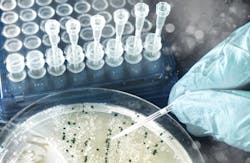Biocides might increase risk of contamination in food industry, study finds
According to a study published this month in Applied and Environmental Microbiology, the use of biocides in the food industry may have an adverse effect on public health, rather than a protective impact as the industry has believed.
Biocides are sometimes used at sub-lethal levels in the food industry as a protective agent against bacteria. However, results from the study show that this may in fact increase antibiotic resistance in bacteria and facilitate their ability to create biofilms, which scientists say can be extremely harmful. A biofilm increases the risk of food contamination and its presence creates a great virulence factor in infections.
For their research, scientists tested the effect of exposure of Escherichia coli (E.coli) bacteria to lower doses of three food-grade biocides, as well as exposure of normally deadly levels of the substances, explained corresponding author Rosa Capita of the University of Leon, Spain, in a statement on the study.
RELATED: Computer system failure puts US meat safety at risk
When exposed to the biocide sodium nitrite, E.coli bacteria increased their resistance to 14 of the 29 antibiotics included in the research. Moreover, the bacteria increased their ability to form biofilms and demonstrated tolerance to the biocide sodium hypochlorite. However, when exposed to trisodium phosphate, bacteria lost their ability to form biofilms and increased their resistance to one antibiotic only.
These findings suggest that there is a need for detailed guidance on how the food industry should use biocides, so that they achieve their desired effect, Capita concluded.
